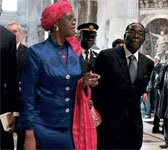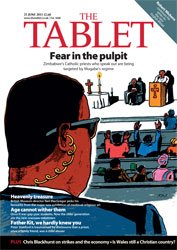Fear in the pulpit - Oppression in Zimbabwe
Catholic priests face arrest and torture by Robert Mugabe’s secret police masquerading as Massgoers as the dictator’s instruments of repression turn their attention to the Church, branding it an enemy of the state.
 In a pastoral letter at the beginning of this year the Catholic Bishops’ Conference of Zimbabwe said “corruption is a cancer destroying our nation”. The bishops urged the country’s political parties to engage in a “serious discussion” about the state of the nation, warning that the alternative was to allow Zimbabwe to “continue to be dogged by violence, political intolerance, injustice, rigging of elections, fear, deception”.
In a pastoral letter at the beginning of this year the Catholic Bishops’ Conference of Zimbabwe said “corruption is a cancer destroying our nation”. The bishops urged the country’s political parties to engage in a “serious discussion” about the state of the nation, warning that the alternative was to allow Zimbabwe to “continue to be dogged by violence, political intolerance, injustice, rigging of elections, fear, deception”.
For messages such as this the Church is currently paying a heavy price, with the Government of Zimbabwe now treating it as one of its major internal enemies. Just what that means for ordinary priests ministering to a million or so Catholics is revealed in chilling detail by one of their number who describes how intimidation of celebrants at Mass has become the norm through the presence in their congregations of secret police loyal to the dictator Robert Mugabe and his party, the Zimbabwe African National Union-Patriotic Front, better known as Zanu-PF.
Speaking anonymously to The Tablet for fear of arrest and torture, Fr B said: “The whole Catholic Church has become an enemy of the state.” He gave the example of a peace service at the Church of the Nazarene in the high-density Glen Norah suburb of Harare (the capital’s suburbs are divided into the formerly white “low-density” suburbs and the old “high-density” African townships) that was broken up by riot police. A week later Fr Mark Mkandla was arrested in Lupane in Matabeleland by police unhappy with the content of his homily.
Fr B said that priests are today routinely subjected to arbitrary arrest and questioning. He himself feels hindered and censored by the constant presence of secret service personnel in his congregation who report back on his homilies. “There’s no freedom of speech. You preach that people are hungry and the moment you say people are hungry those in authority feel attacked. So you are an enemy,” he said. “Zimbabwe has become a police state.”
As a result, priests in Zimbabwe “don’t have any freedom to preach the Word as we would want to even within the Church because you never know what kind of visit you may get after Mass. You know that the secret police are attending and the moment you finish, things happen.” This might mean a telephone call telling the priest to come to the police station where he is interrogated. “If you are lucky you are interviewed and let go; if you are not so lucky you are tortured a little bit,” he states matter-of-factly, before adding: “Our phones are tapped. When you talk you can actually hear someone interfering! We know our internet lines are tapped all the time and so sending messages outside is very dangerous.”
Even wearing a Roman collar is extremely dangerous, says Fr B, because “the moment the authorities know you are a priest you are labelled an enemy”. A few weeks ago two priests were imprisoned and were humiliated by being forced to undress before female police officers, he said. Fr B himself had a close escape recently when he was stopped in the road by armed police.
 “I was almost killed. I had to humble myself,” he said of the pleading that helped save his life. “They had guns and told me: ‘We can make you disappear in a moment and you will never be found.’ Then someone said: ‘Let him go.’ I was shaking.” He underlines that threats to “disappear” people are not idly made. “People are disappearing day in and day out. After some time their bodies are found in some disused mine or dam.”
“I was almost killed. I had to humble myself,” he said of the pleading that helped save his life. “They had guns and told me: ‘We can make you disappear in a moment and you will never be found.’ Then someone said: ‘Let him go.’ I was shaking.” He underlines that threats to “disappear” people are not idly made. “People are disappearing day in and day out. After some time their bodies are found in some disused mine or dam.”
It is government policy, he says, to foment divisions between Christians by courting indigenous or “Apostolic” churches that have sprung up in villages and suburbs under self-appointed pastors. Supporters of Zanu-PF visit these churches campaigning for votes. “Their language is to attack the Catholic Church,” Fr B explains. These political agitators try to blame the Church for the country’s ills and play the loyalty of the Apostolic churches off against the “treachery” of the Catholic Church. Pastors who try to resist their propaganda have found their congregations divided as those willing to support Mugabe are offered the means to start new churches and given land to do so.
Of President Mugabe’s much publicised attendance at the late John Paul II’s beatification, Fr B said: “Just the week before he was attacking us publicly and the next week he is in Rome for the beatification!” Though he accepts that the Vatican did not issue a personal invitation to the tyrant, he added: “Mugabe being Mugabe – whatever chance arises he takes advantage of because he can’t go to another European country because of the sanctions.”
“We live in fear,” said Fr B, adding of the 87-year-old President: “The old man is no longer in charge: it is the army and the police intelligence who are actually running the affairs of the country and they decide whatever they want.” For that reason, Zimbabweans also know that the departure or death of Robert Mugabe won’t solve their problems.
Mugabe, who has dominated the political scene in Zimbabwe for more than three decades, now wants national elections brought forward, a move church leaders and opposition parties are against. Early elections would undermine, they say, the Global Political Agreement (GPA) that was agreed between Zanu-PF and the Movement for Democratic Change, or MDC, led by Morgan Tsvangirai, in September 2008. The GPA came about as a result of the refusal of Zanu-PF to concede that the MDC had secured a parliamentary majority in that year’s election. A brutal campaign of violence rained down on MDC members until Tsvangirai opted to withdraw rather than expose his followers to further violence. Under the agreement Mugabe was allowed to retain the presidency and Tsvangirai became Prime Minister. But as the history of Zimbabwe since independence in 1980 shows, Zanu-PF has no intention of ceding power. “We were hoping that in forming the Global Political Agreement things would go OK. But that hope has faded now because we know that even if the opposition wins, they won’t get into government because of the army,” said Fr B, adding that he believes that the situation in Zimbabwe will only change through international intervention. But in a country of 91 per cent unemployment, where people are barely surviving, how long can they or should they have to wait?
Referring to the economic wasteland created by the Government, Fr B highlights how the regime exploits people’s desperation, saying: “The Government knows people are poor and they use that, telling them: ‘If you want to get some money – come to us.’” This is code for the payments the government makes for carrying out orchestrated beatings of its opponents.
The terms of the GPA call for a new constitution and new elections. But as negotiations on these are ongoing between Zanu-PF and the MDC, an early election would stymie the formulation of a new constitution and its approval by a referendum. It would also ensure that the electoral roll would not be overhauled in time for the vote.
According to historian and writer R.W. Johnson, in “Preventing Electoral Fraud in Zimbabwe” – a report written for the South African Institute for Race Relations, the earliest date for elections following a referendum on a new constitution would be 14 June 2012. But Johnson suggests that hopes for free and fair elections are threatened by the manipulation of Zimbabwe’s electoral rolls. He shows that 360,500 new voters have been added to the register in just two years, despite documented mass emigration from Zimbabwe.
A sure indicator that something is amiss is the presence on the roll of hundreds of young people under the age of 17, some small children. At the other end of the scale he documents thousands of people over the age of 100! There are 16,033 new voters over the age of 70 years, of whom 1,488 of these are over the age of 100 – some as old as 109 years of age. (According to the World Health Organisation, life expectancy in Zimbabwe, at 43 for men and 44 for women, is one of the lowest in the world.) In his estimation there are as many as 2.5 million “phantom voters” currently on the register.
Johnson’s quotation from Joseph Stalin at the beginning of his report from is a telling reminder of the importance of an impartial electoral process: “The people who vote decide nothing! The people who count the votes decide everything!” In Johnson’s view, only a completely new electoral roll drawn up by an independent body would make the next election credible. His report concludes that the current roll is not only “a wholly incredible document but an extremely dangerous one, which lends itself to all manner of electoral manipulation or ballot-stuffing. It is more or less guaranteed to produce disputed results”.
As Zimbabwean human-rights lawyer Beatrice Mtetwa, like the Catholic bishops, acknowledges in the foreword to Johnson’s report, a road map to free and fair elections under a new and democratic constitution is the holy grail for Zimbabwe.


 Votes : 0
Votes : 0









